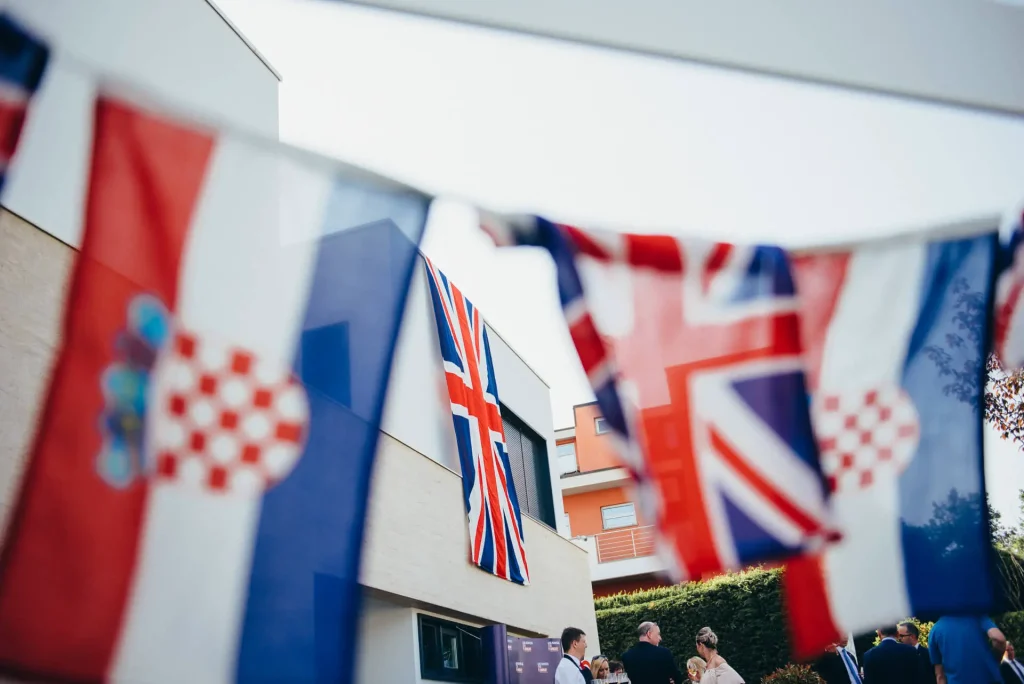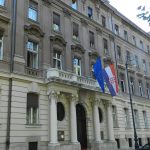The diplomatic relations between the UK and the Republic of Croatia were formally established on June the 24th, 1992.
Almost 29 years later, I found myself in front of the Ambassador’s residence and being warmly greeted by Snježana Vukić, the British Ambassador’s advisor for communications. If you’re inclined to think in stereotypes, you would expect a cup of tea, but instead, the cup of coffee with the creamy flat white texture turned out to be a much better beverage during the interview—both for me and for the Ambassador.
”We can sit wherever you like”, said Ambassador Andrew Stuart Dalgleish as he welcomed me inside the premises. A warm, kind, competent communicator that evened out the serious conversation about diplomatic topics with occasional humorous remarks to ensure both had an enjoyable and informative talk. The pins of both British and Croatian flags on his left coat lapel turned out to be a visual clue to the notion the friendship the UK and Croatia has long since held is still going well.
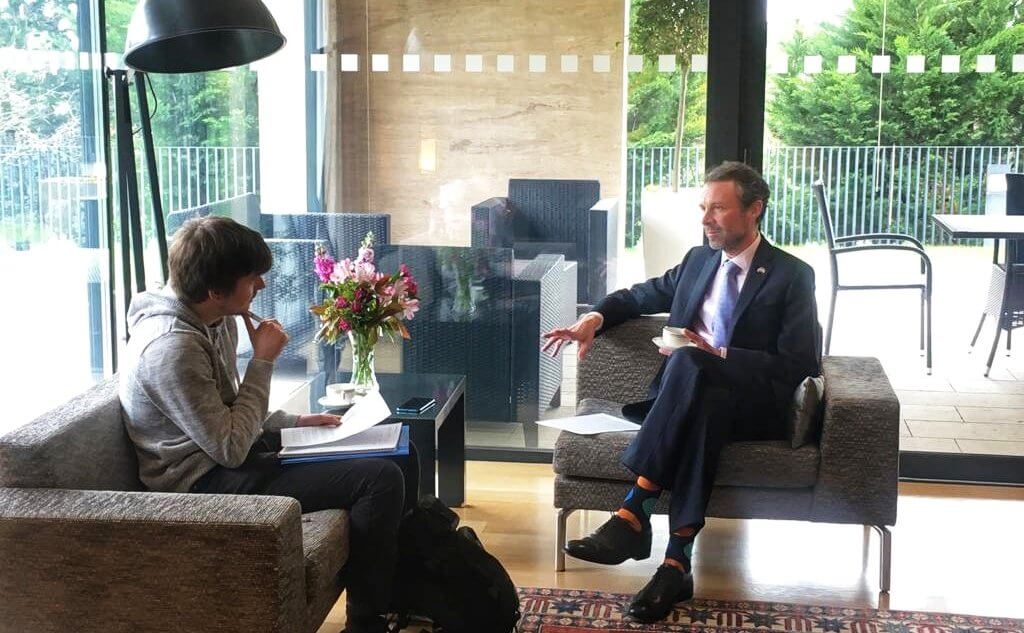
TCN reporter Ivor Kruljac with Ambassador Andrew Dalgleish © British Embassy Zagreb
Croatia and UK sharing western values
Andrew Dalgleish has served the UK as the Ambassador in Croatia since July 2016. He graduated with First Class Honours Degree in European Law at the University of Warwick, which included a year at Bordeaux University IV studying French Law. From 1998-1999 he worked in the Department of Social Security. His extensive knowledge of European law saw him work in UKREP (the United Kingdom Permanent Representation to the European Union) from 1999 to 2004, firstly as the Second Secretary for Social Affairs, and from May 2001 as a First Secretary for the Environment.
That same passion for the environment led him to DEFRA (Department for Environment, Food & Rural Affairs), where he was the Project Manager for the Climate Change effort during the UK Presidency of the EU, and he also represented the EU in UNFCCC plenary meetings. In his service to DEFRA from 2006 to 2008, he participated in the creation of the Office of Climate Change (2006), and moved to be the Deputy Head of Group, in Environmental Land Management too. From 2008 to 2011, Dalgleish continued working as the Head of the European Union Strategy Department, where he held preparations ahead of the Prime Minister’s European Council briefings and assisting other ministries in shaping deliverable policies; coordinating influencing strategies and lobbying efforts within the EU.
”I should tell you, I’d never been to Croatia before I arrived here professionally, and I’m one of those rare British people who hasn’t been here on holiday“, Dalgleish began as I asked him about his impressions of the country, and of course, of Croats.
”What struck me the most was the warmth of the people, the welcome, general sense of friendliness. Croats are really proud of their country, and quite rightly so, and they also really want you to love the country too,” said the Ambassador, adding that the Croats he met took him to lots of places and restaurants where he discovered various new dishes.
He continued that one of the delights of Croatia in his opinion is its variety, and he finds it impossible to pick one location that fascinated him the most.
”I remember going to Vučedol near Vukovar, and it was mindblowing. The walking that I can do in Žumberak, not far from Zagreb is fantastic. You go to Brijuni and you have Roman ruins, or you go to Poreč and you’ve got the basilica there, or Vis, which is a paradise,” he stated in his list.
His description of Croats as warm and friendly seems to demonstrate to what we could call Croatian values. But, what are British values? When asked this question, Dalgleish argued that these are habits we may consider to be national characteristics, but they aren’t values, per-se.
”Brits are very proud of the idea that we believe in fair play, that will we do the right thing even if we lose the game. Maybe that’s why we’re terrible at sports,” the Ambassador said with a touch of humour as he was describing the national characteristics of British citizens.
While stating that Croats should be asked what the UK is most famous for in Croatia, as an Smbassador who frequently talks to Croats, he did manage to come up with some conclusions on the issue.
”Football, clubs such as Chelsea or Manchester City, but also the British sense of humour. Croats laugh at similar things as we do. So much British TV is here, and the cultural exchange is really, really important as well,” said the Ambassado,r referring to cult shows such as Only Fools and Horses (Croatian: Mucke).
”The Royal Family is very recognisable here, too. I think lots of interest and affection is shown for the Royal Family, and of course our brilliant ‘weather’ “, the Ambassador added.
When it comes to joint values, the Ambassador noticed that Croatia and the United Kingdom share many opinions that are neither Croatian nor British values, but rather a Western, European, or even Transatlantic view of the world.
”This encompasses a wide range of things that we very often take for granted but which are the foundations of our societies”, explained the Ambassador, citing examples the freedom of the media or the rule of law.
”The democracies we live in, embrace and find to be a really important foundation are what we need to protect and defend for the sake of our societies.”
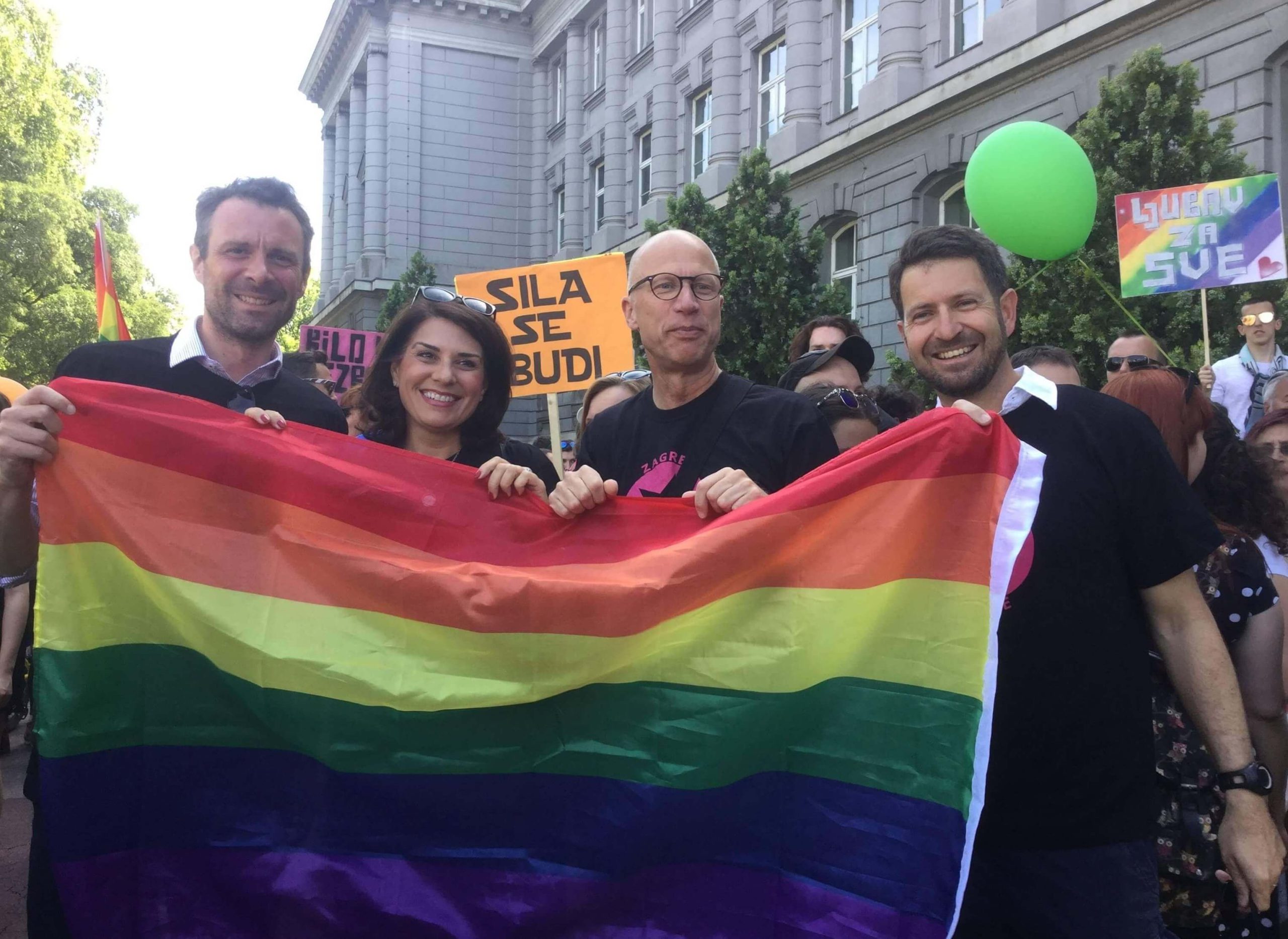
Zagreb Pride, Ambassador Dalgleish with other diplomatic colleagues during Zagreb Pride © British Embassy Zagreb
Things could be better at the commercial level, but there have been improvements…
The values ambassador Dalgeish described are the basis of diplomatic relations between Britain and Croatia, but how good is this relationship, actually? Where is it at its best, and where is it at its worst, where can things be better?
”The starting point is that diplomatic relations are really, really good, and I feel lucky that the cooperation our two countries enjoy is overwhelmingly positive,” said the Ambassador. He added that as in any close relationship, two countries might disagree about something, but to the British Ambassador, being able to disagree and be fine with that is also a sign of a strong relationship.
”One great expression of our cooperation is NATO where we’re really good, very close partners,” continued the Ambassador, even referring to the recent DEFENDER-Europe-21 exercise in Zadar.
In addition to that, the recent visit of Royal Air Force Aerobatic Team to Croatia’s Krila Oluje Pilots is also a good sign of cooperation and mutual friendship.

The Royal Airforce Aerobatic Team and the Ambassador © British Embassy Zagreb
”Croatia occupies an almost unique position in terms of expertise that it can give on Southeastern Europe, as well as comprehensive understanding of what is a very complicated situation in this region,” he said.
”All of this is very good, strong and positive, and it makes a global impact, and it’s not just about how our two countries get along,” he said.
The Ambassador also added that both Croatia and the UK are members of the Global Media Freedom Pledge and stand for freedom in the media. He also works very closely with both the Croatian Government and Croatian president Zoran Milanović to promote awareness of the threat of climate change.
”You’d expect me to say I communicate the most with the Ministry of Foreign Affairs, and it would be true, it’s where diplomatic relations are grown in a formal way. But I also communicate with all branches of the Government, with Parliament and with Pantovčak. Just today, I’ve been to the ”Dr Fran Mihaljević” Clinic for Infectious Disease in Zagreb where I talked with its director, Professor Alemka Markotić, about what we can do about COVID-19“, added the Ambassador.
However, as expected, there are areas in which British-Croatian cooperation could be much better.
”Where I’d like things to be better, speaking very frankly, is in commercial relations. The UK has been less present on Croatian market and less accessible due to simple geography, especially when compared to the likes of Austria or Germany. When I arrived here, this is where I said I’d want to try to make a difference. I have made a difference, I hope. A small difference, but its a difference in the right direction, and the commercial relationship is better for that today,” said the Ambassador.
These small steps saw trade in goods between the United Kingdom and Croatia increase by about 10% in the past few years, a good indicator of how things have been advancing, regardless of the concerns in the past that Brexit might affect it negatively.
”We’ve also seen investments from the Croatian side into the UK increase in the past few years – for example, Mate Rimac has just opened his research & development centre in the UK – we did help facilitate that through our Department for International Trade (DIT)“, added Ambassador.
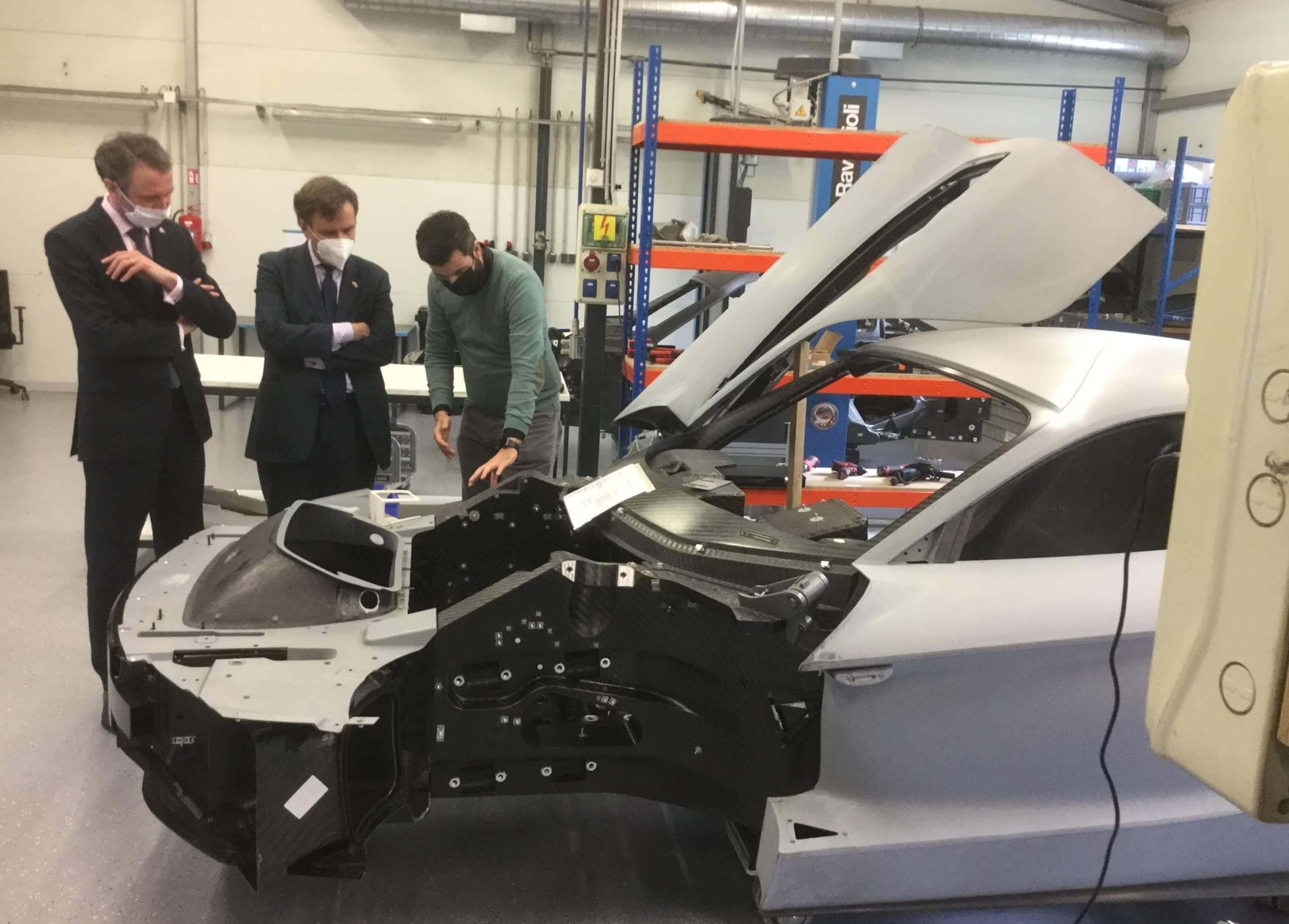
UK Minister Greg Hands and Ambassador Andrew Dalgleish with Mate Rimac in Rimac Automobili © British Embassy Zagreb
In addition, the Ambassador used every opportunity to facilitate business and trade contacts between the UK and Croatia. When UK State Secretary in the Ministry of International Trade, Greg Hands, visited Croatia last month, the Ambassador hosted a dinner for him with several leading Croatian business figures for both sides to explore how they might further improve business connections between the two countries.
On top of that, the recent confirmation from the Justice Ministry that British citizens may purchase property in Croatia only further benefited the development of trading between the two European countries.
Leaving the table for face to face conversation
The cooperation Ambassador Dalgeish described sounds great, but when it comes to diplomatic relations with the UK, the elephant in the room screams out in need of a special mention. Brexit remains a hot topic for the British public, and as Croatia is a member of the EU, what changes can Croatia expect in diplomatic relations with the UK as the European island nation which chose to step away from the bloc?
Dalgleish sees Brexit both as a challenge and as an opportunity to deepen diplomatic relations between the UK and Croatia.
”With 28 members states as it was before, you had so many people around the table that when ministers came together for a council meeting, there were just too many people to have a meaningful conversation one on one. So you’d say ”see you in Brussels”, and you would, and you’d wave, and you’d smile, and you might even say hello. But you don’t have a meaningful conversation all the time,” said Ambassador Dalgeish from his own recollection as he spent a lot of time in Brussels.
”We aren’t at that table anymore. That means we’re going to have to make more of an effort but also that we will have the opportunity to build a more meaningful relationship with Croatia and I think that’s quite exciting for me in the job that I do,” said ambassador Dalgleish calmly but optimistically.
”Whereas before, our bilateral business might have been conducted during these convenient moments in Brussels at these meetings, that doesn’t happen anymore. Now, we will hold them in London, and we will hold them in Zagreb. I think that’s quite the opportunity to build something more meaningful than what we had in Brussels,” stated the Ambassador.
As the UK has a massive impact on the world and can boast of very strong diplomatic relations with other big players on the geopolitical stage, I wondered how important the relationship with Croatia actually is, from the UK’s point of view, and in regards to the country’s interest in global affairs.
”We look at Croatia as a global partner, and not just from the point of what we get from this bilaterally, but in what we’re doing together to make a difference; Croatia sits as a partner,” the Ambassador pointed out.
Already having mentioned the importance of Croatia’s knowledge on Southeastern Europe and the instances of good cooperation through NATO, and issues such as climate change or COVID-19, the British Ambassador’s claims are evidently backed up.
”I was sent here by the Foreign Secretary with a very serious mission to deepen the strength of the cooperation that we enjoy. It’s a very important mission for me, and I think that’s a reflection of how seriously we take the relationship with Croatia,” confirmed the Ambassador.
The British Royal Family has always been very welcome in Croatia
The Ambassador already mentioned cultural exchange, and the British Embassy as an institution plays a significant role in the cultural promotion of the country. But, given the UK consists of four nations: England, Scotland, Wales, and Northern Ireland, is it possible to represent all these cultures equally? Being Her Majesty Queen Elisabeth II’s Ambassador and representing the United Kingdom of Great Britain And Northern Ireland, Dalgeish shows his dedication to the job by equally representing all of the UK’s four nations.
”We will proudly fly the St. George’s Cross when it’s St George’s Day for England, but also the Saltire (Scottish flag), when it’s St. Andrew’s Day. I wouldn’t say there is one element of the four nations that is dominant,” said the Ambassador.
Culture is heavily linked with history, and the UK has been known in the past as a vast empire with colonies that are sovereign independent countries today. As Croatia was never colonised by the UK, are there any differences between the UK’s relations with Croatia compared to other countries?
”The UK has a very long list of diplomatic relations, both with the countries who are part of Commonwealth, who were previously colonies, and with countries who were not colonised. So, there’s no difference in forming a relationship with Croatia in comparison to such countries. There’s nothing I can do about what happened in 1600’s or 1700’s, but I want to see what we can do in 2021,” said the Ambassador, stating that the Ambassador’s job is to look ahead, not backwards, to work on building the future, while acknowledging all the sensitivities of the past.
As the Ambassador already mentioned, his regular cooperation with the official bodies of the Republic of Croatia is the formal level of communication, while cultural exchange also has a key element in non-formal communication, particularly in education.
”I love going to schools. Talking to the kids about what they think about the UK, and what can they teach me about Croatia, and going to English lessons and causing chaos,” said the Ambassador on his experiences with the school system in Croatia.
With the mention of the school system in Croatia, I couldn’t help but recall my experience in education. Croatians seem to be quite talented when it comes English, but it is mostly pushed towards the American version of English.
”Oh yes I know, it’s tragic,” Ambassador Dalgleish joked in response when I shared my recollections.
He continued by saying that he is happy to see Croats speaking English so excellently, and he doesn’t mind what version they learned, nor does he have any intention to have British English compete with American English.
”I don’t hear too many American accents when talking to Croats, maybe it has something to do with British TV shows, maybe it doesn’t, I don’t know. But either way Croats should be very proud of how well they speak English,” he concluded.
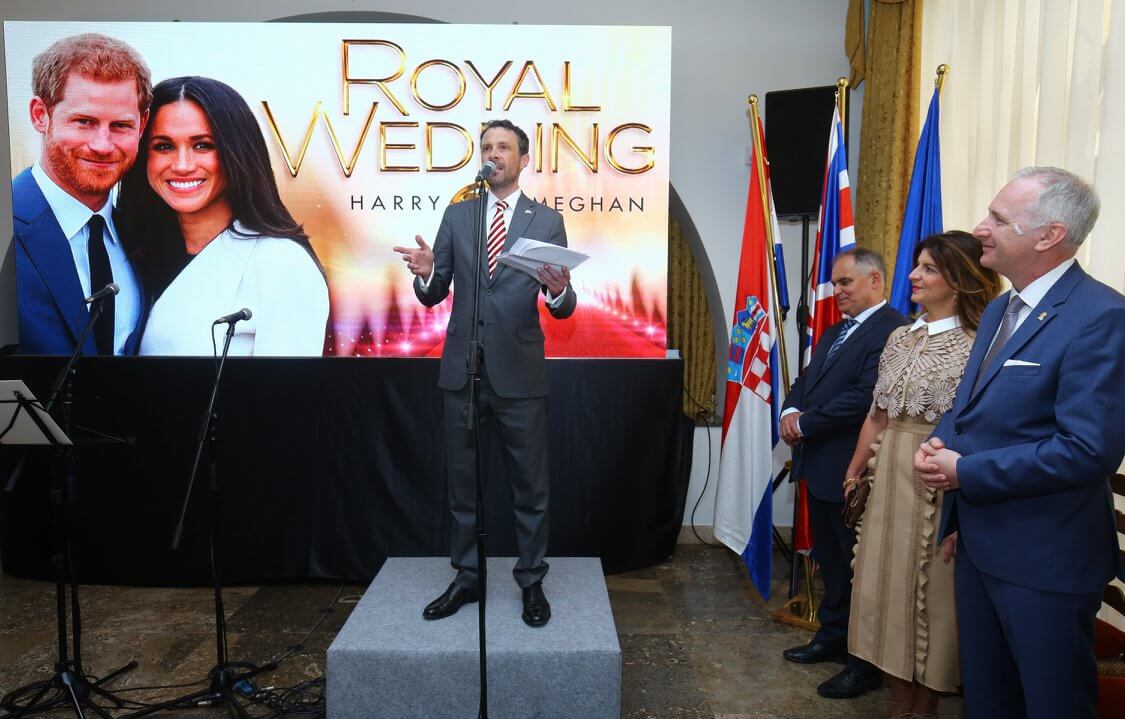
Ambassador Dalgleish on the Royal Wedding Party in Split © British Embassy Zagreb
As also already mentioned, the Royal Family is a big part of the of the fabric of Britain as it is a parliamentary monarchy.
The Royal family, particularly Prince Charles and Duchess Camilla seem to be very fond of Croatia indeed. Their last visit back in 2016 (following the Prince’s earlier visit in 1996) saw the meeting with former Prime Minister Tihomir Orešković, former President Kolinda Grabar Kitarović, for whom Prince Charles highlighted his particular interest in the Croatian economy, as well as an interest in investing in Croatian youth. They also attended the commemoration of the 400th anniversary of the death of the famous English writer and poet William Shakespeare at the Croatian National Theatre (HNK) in Zagreb.
”Their Christmas card even had a photo of them with the members of a folk band from Osijek“, said Ambassador Dalgleish referring to the photo the British Royals took with the dancers of the HKUD 1862 ensemble.
And as Glas Slavonije reported, Osijek is very special to Prince Charles as his Great Grandfather Franz von Teck was born there.
Most recently, however, the Royal Family suffered a tragic loss as the much-loved Prince Philip passed away. Croatian Prime Minister Andrej Plenković expressed his deep condolences to Queen Elizabeth II publicly on Twitter, but as the Ambassador pointed out, he also sent condolences through official channels. Social media and overall technological progress now allows world leaders to communicate more directly, but it doesn’t diminish the role of the British Embassy.
”Everyone who wanted to express their condolences, expressed them, from Pantovčak, to Parliament and the Government. Social media is an additional tool for us regarding public statements, but of course, embassies remain here for those sensitive issues that need to be discussed Government to Government, not over social media. We’re also here for our citizens, and we can’t be present in the whole country, so travelling, but also social media, are also very important here,” explained the Ambassador.
The always attractive Dubrovnik was found to be the best example when it comes to culture in the country, as Game of Thrones and Star Wars were filmed there.
In the UK, the film industry, in addition to private incentives, gets financial support from the state, as the British Film Institute (BFI) is sponsored by a Government department. Following the examples of Star Wars and GoT, could there be more promotion from the BFI of Dubrovnik or Croatia in general as a good filming location?
”I don’t really need to say anything about Dubrovnik. Dubrovnik speaks for itself, and more Brits visit Dubrovnik annually than anyone else,” said the Ambassador with delight.
But if Dubrovnik did happen to need a good word or two; the Ambassador stated that he is not the tourist bord, and promoting Dubrovnik is not part of his duties.
”If someone from the UK contacts me and says that wants to film anywhere in Croatia, but is facing problems, then I’m here. But in general, the less I need to intervene, the better“, said the Ambassador adding that he found out about UK film producers filming in Croatia after it had already happened. One of the more recent examples of that was the filming of the ”The Ipcress File” series in Zagreb, and the fact that the ambassador didn’t need to intervene again only proves the steady and good relations between the nations.
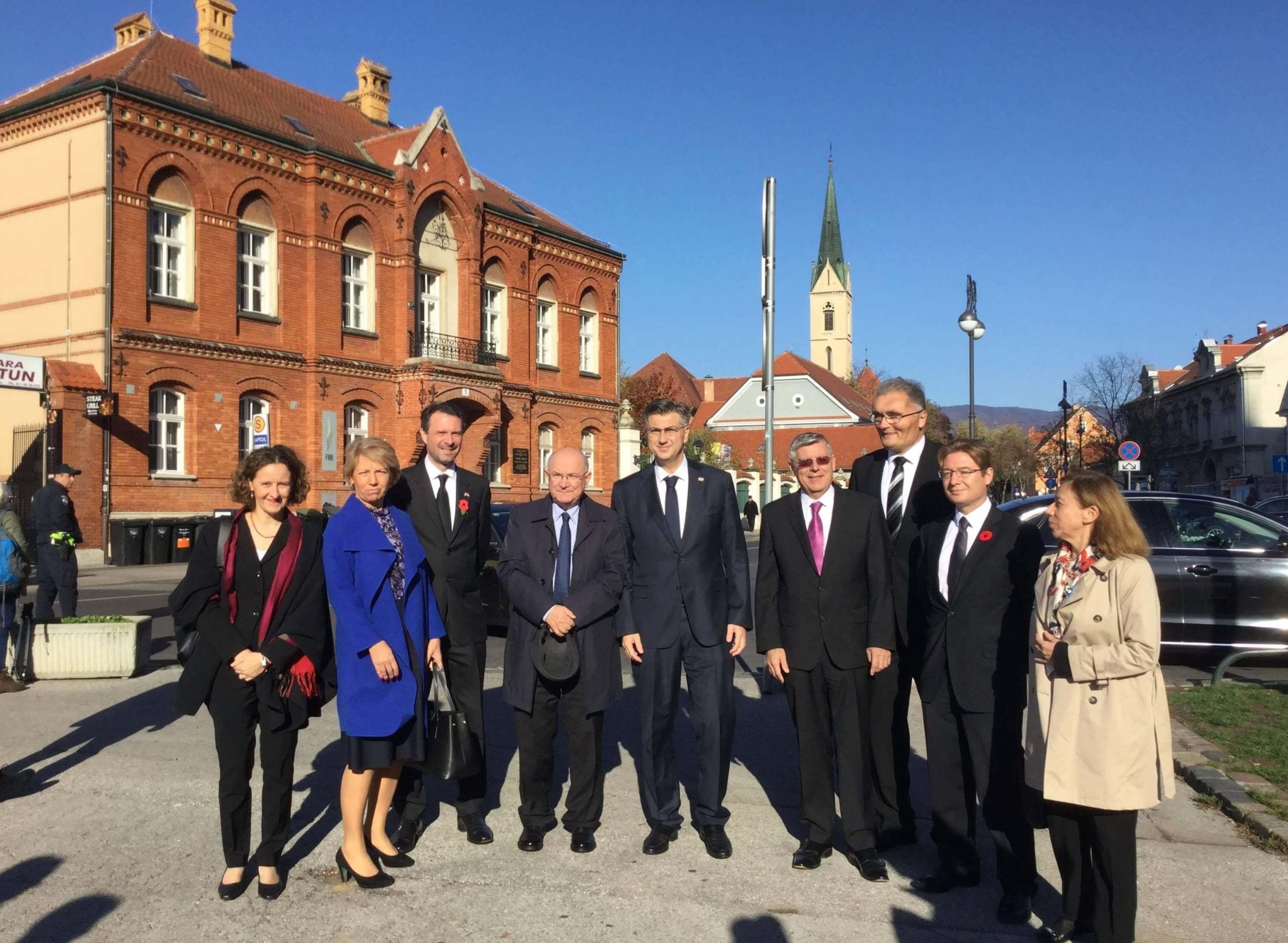
Ambassador Dalgleish, other Ambassadors and Croatian officials attending a Mass for all victims of WW2 at the Zagreb cathedral © British Embassy Zagreb
British and Croatian Ambassadors: Swapping countries but closely talking and cooperating
Foreign embassies, of course, are in Croatia for foreign citizens, and the British Embassy is no exception to that rule.
In addition to the British Embassy and a consul in Zagreb, the UK has two additional consuls: in Split and Dubrovnik, to make sure it is present for UK citizens, not just visitors, but also for Brits who work and live in Croatia.
”We have an honorary consul in Dubrovnik, which isn’t officially part of the embassy, but is there to assist our citizens visiting Dubrovnik,” pointed out Ambassador Dalgleish praising honorary consul Mark Thomas for doing a great job.
When it comes to Croats, visas to visit the UK are luckily not needed, but Croatian citizens can contact the embassy to get more information about Great Britain should they need to.
”When it comes to trying to invest in the British market or getting their products or expertise into the UK, Croats need to contact the Croatian Embassy in London. I’m frequently in contact with the Croatian Ambassador there, Igor Pokaz, who is doing a brilliant job for our two countries to fund and nurture different ways of cooperation,” explained the Ambassador when discussing his relationship with the Croatian Ambassador in London, Igor Pokaz.
Overall, British-Croatian diplomatic relations are good in general, and the Ambassador’s assurance that Brexit can be an opportunity to deepen the already good relationship is a promise to the bright future of friendship. But, as it takes two to have a combo as good as fish & chips, Croatia also has to show that it is willing to continue to develop a good friendship with the UK.
If you’re a British citizen or a Croatian citizen in need of information, here is how you can reach a British diplomatic mission in Croatia:
In Zagreb:
British Embassy
Adress: Ivana Lučića 4
Mail: [email protected]
Phone number: +385 1 60 09 100
British Council (for cultural realations):
Adress: Savska 32
Mail: [email protected]
Phone number: +385 1 48 99 504
More info on British Council official website.
In Split:
British Consulate
Adress: Obala Hrvatskog narodnog preporoda 10/III
Phone number: +385 1 60 09 100
In Dubrovnik:
British Honourary Consulate
Address: PP 454
Phone number: + 385 1 60 09 100
For all the latest news about the British Embassy straight from the source, visit their official website. You can also follow them on Facebook, Youtube, Flickr, Instagram and Twitter (the British Ambassador is on Twitter and Instagram too).
To read more from the series “Friends of Croatia”, follow TCN’s dedicated page.
For more about UK – Croatia relations, follow TCN’s dedicated page.

